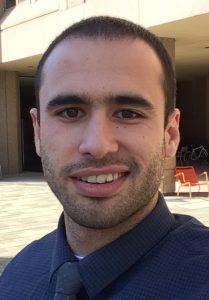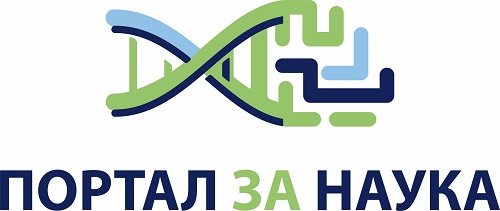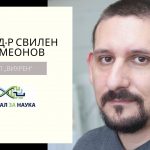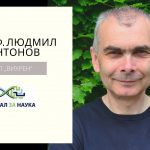Dr. Marin Bukov
Dr. Marin Bukov completed his secondary education in 91 German Language High School Prof. Konstantin Galabov, city of Sofia. In 2011, he obtained bachelor’s degree in Physics and bachelor’s degree in Mathematics in Ludwig-Maximilian University of Munich. In 2013, Dr. Bukov obtained his master’s degree in Physics in the same university. He was awarded doctoral degree by Boston University in Boston, Massachusetts. Upon completion of the doctoral studies, Dr. Bukov graduated University of California. His research interests are focused in the field of quantum physics. Additional information on the research interests and projects of Dr. Bukov can be found on: https://mgbukov.github.io/.
In 2020, Dr. Bukov was awarded Marie Sklodowska-Curie Individual Scholarship. In 2017, he obtained also scholarship for his doctoral studies from Moore Foundation. Dr. Bukov is the winner of Alvaro Roccaro Memorial Award in recognition of his outstanding achievements in physics in 2017, and of Gertrude and Maurice Goldhaber Award. In 2012, he received DAAD Award for his outstanding achievements as a foreign student in German universities. Dr. Bukov received scholarship funded by Bavaria for research and arts at Bavarian Ministry of Science (2009-2013).
Reinforcement learning to control quantum matter out of equilibrium
 The ability to manipulate quantum matter in equilibrium is a fundamental achievement of 20th century physics. The main objective of modern physics is to extend this knowledge so as to cover systems out of equilibrium. Being at the border of equilibrium and non-equilibrium, the periodically driven (“Flockè”) systems are particularly suitable for this purpose. Based on the periodic drives, experiments with ultracold atoms may reproduce such phenomena currently unavailable in conventional materials, such as artificial calibration fields or topological and dynamically localised matter. Our knowledge of how to manipulate systems exposed to intensive periodic drives is at an early stage, especially with regard to highly interacting systems. We propose to overcome current limitations by combining artificial intelligence algorithms with ideas taken from statistical physics and quantum control. We will develop a new theoretical framework for non-adiabatic control of the quantum state of many bodies subjected to strong periodic drives, which is used as the basis for optimal scrambling, weaving, heating and cooling of quantum states. Understanding the dynamic properties of multi-body systems will improve the state-of-the-art techniques to manipulate cold atoms, optically trapped ions, superconducting qubits, and quantum solids. The quantum control toolkit we will be accompanied by reinforcement learning – one of the most promising techniques in the field of artificial intelligence. Deep reinforcement learning is extremely suitable to manipulate non-equilibrium states, since it is able to identify effective macroscopic degrees of freedom, even when solutions on microscopic equations of motion are not available. The discovery of physical principles of non-equilibrium control has the potential to reveal new relationships between quantum dynamics, statistical mechanics, optimal control, and machine learning. Our proposal establishes a roadmap for creation of future materials and technologies based on non-equilibrium processes in condensed matter physics, quantum optics and quantum calculations.
The ability to manipulate quantum matter in equilibrium is a fundamental achievement of 20th century physics. The main objective of modern physics is to extend this knowledge so as to cover systems out of equilibrium. Being at the border of equilibrium and non-equilibrium, the periodically driven (“Flockè”) systems are particularly suitable for this purpose. Based on the periodic drives, experiments with ultracold atoms may reproduce such phenomena currently unavailable in conventional materials, such as artificial calibration fields or topological and dynamically localised matter. Our knowledge of how to manipulate systems exposed to intensive periodic drives is at an early stage, especially with regard to highly interacting systems. We propose to overcome current limitations by combining artificial intelligence algorithms with ideas taken from statistical physics and quantum control. We will develop a new theoretical framework for non-adiabatic control of the quantum state of many bodies subjected to strong periodic drives, which is used as the basis for optimal scrambling, weaving, heating and cooling of quantum states. Understanding the dynamic properties of multi-body systems will improve the state-of-the-art techniques to manipulate cold atoms, optically trapped ions, superconducting qubits, and quantum solids. The quantum control toolkit we will be accompanied by reinforcement learning – one of the most promising techniques in the field of artificial intelligence. Deep reinforcement learning is extremely suitable to manipulate non-equilibrium states, since it is able to identify effective macroscopic degrees of freedom, even when solutions on microscopic equations of motion are not available. The discovery of physical principles of non-equilibrium control has the potential to reveal new relationships between quantum dynamics, statistical mechanics, optimal control, and machine learning. Our proposal establishes a roadmap for creation of future materials and technologies based on non-equilibrium processes in condensed matter physics, quantum optics and quantum calculations.

 Previous Post
Previous Post Next Post
Next Post